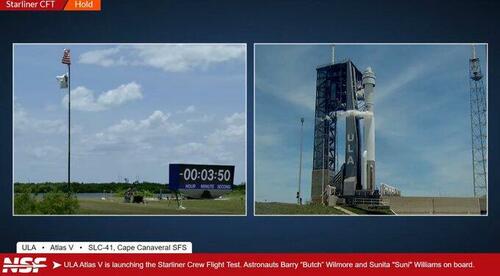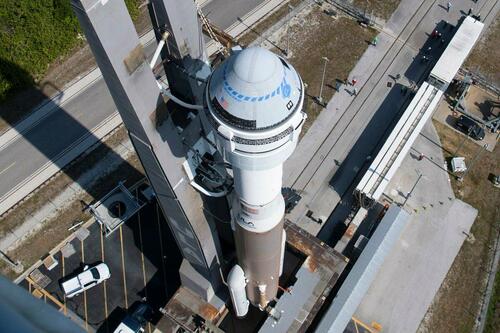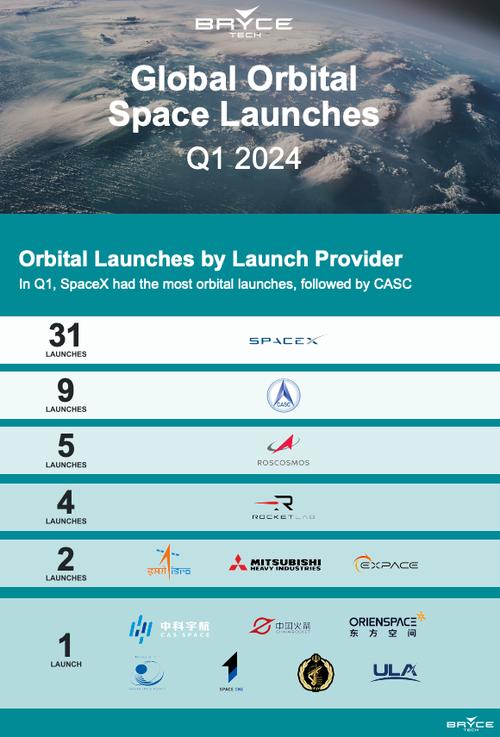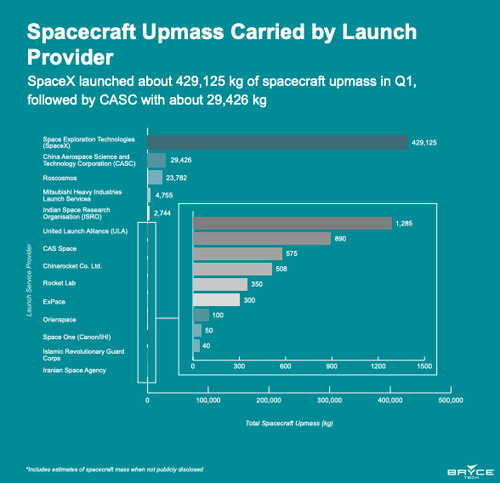
Update (1245ET):
The Boeing-Lockheed Martin joint venture United Launch Alliance wrote on X, "Hold. The countdown has been stopped. Safing of the Atlas V, Starliner and launch pad systems is underway."
Hold. The countdown has been stopped. Safing of the Atlas V, Starliner and launch pad systems is underway.
— ULA (@ulalaunch) June 1, 2024
"The launch of Boeing’s Starliner spacecraft has been delayed. Ground controllers called a hold with 3 minutes and 50 seconds left in the countdown. No reason for the delay was immediately given. There is another launch opportunity Sunday," Washington Post's Christian Davenport wrote in a blog update.
"How can Space X launch 5 of these per day yet NASA and Boeing can’t launch even one in a month??" one X user asked.
How can Space X launch 5 of these per day yet NASA and Boeing can’t launch even one in a month??
— PvC 🎧 (@AZPaulC) June 1, 2024
"Need to get some SpaceX personnel at ULA asap," one X user said.
Need to get some SpaceX personnel at ULA asap.
— JVLIVS (@ChairmanOfBased) June 1, 2024
They seem to know how to get these things done over there.
Sigh, Boeing...
And #Starliner is a scrub again at L-3 minutes.
— Sisyphus (@PoliSisyphus) June 1, 2024
This is really sad.
The US could really use two vehicles for getting humans to space but @BoeingSpace is just not putting it together. pic.twitter.com/g51dACXPod
* * *
NASA and Boeing are preparing to launch the much-delayed crewed flight of CST-100 Starliner at 1225 ET from NASA's Kennedy Space Center in Florida, atop an Atlas V rocket from the Boeing-Lockheed Martin joint venture United Launch Alliance.
Weather conditions are 90% favorable for launch, Mark Burger, the launch weather officer at Cape Canaveral Space Force Station, told CNN.
The Saturday launch comes after the first May 6 launch was halted just two hours before launch time due to a faulty pressure valve on the Atlas rocket. Days later, a helium leak and another issue were detected in Starliner's propulsion system.
"This is a test flight, we know we're going to learn some things," Boeing's commercial crew vice president Mark Nappi told reporters on Friday.
The CST-100 Starliner will ferry two astronauts, Sunita "Suni" Williams and Barry "Butch" Wilmore, to the International Space Station. They are expected to reach the ISS around midday Sunday and stay for about a week.
In 2014, NASA awarded Boeing $4.2 billion and Elon Musk's SpaceX $2.6 billion in contracts to create vehicles to ferry astronauts to space.
Since then, Elon Musk's SpaceX has launched nine crewed missions to the ISS since 2020, while Boeing's Starliner, plagued with glitches and failures and years behind schedule, has yet to lift off the ground with astronauts.
Watch: Launch Event Live Here:
According to space research firm BryceTech, SpaceX was the global leader in space launches in the first quarter, totaling 31, with China in second at 9 and Russia in third with 5.
"SpaceX launched about 429,125 kg of spacecraft upmass in Q1, followed by CASC with about 29,426 kg," the report said
Boeing, along with the rest of the US legacy defense companies, and entire countries - like superpowers, such as China and Russia - are quickly falling behind Musk's SpaceX.
Update (1245ET):
The Boeing-Lockheed Martin joint venture United Launch Alliance wrote on X, “Hold. The countdown has been stopped. Safing of the Atlas V, Starliner and launch pad systems is underway.”
Hold. The countdown has been stopped. Safing of the Atlas V, Starliner and launch pad systems is underway.
— ULA (@ulalaunch) June 1, 2024
“The launch of Boeing’s Starliner spacecraft has been delayed. Ground controllers called a hold with 3 minutes and 50 seconds left in the countdown. No reason for the delay was immediately given. There is another launch opportunity Sunday,” Washington Post’s Christian Davenport wrote in a blog update.
“How can Space X launch 5 of these per day yet NASA and Boeing can’t launch even one in a month??” one X user asked.
How can Space X launch 5 of these per day yet NASA and Boeing can’t launch even one in a month??
— PvC 🎧 (@AZPaulC) June 1, 2024
“Need to get some SpaceX personnel at ULA asap,” one X user said.
Need to get some SpaceX personnel at ULA asap.
They seem to know how to get these things done over there.
— JVLIVS (@ChairmanOfBased) June 1, 2024
Sigh, Boeing…
And #Starliner is a scrub again at L-3 minutes.
This is really sad.
The US could really use two vehicles for getting humans to space but @BoeingSpace is just not putting it together. pic.twitter.com/g51dACXPod— Sisyphus (@PoliSisyphus) June 1, 2024
* * *
NASA and Boeing are preparing to launch the much-delayed crewed flight of CST-100 Starliner at 1225 ET from NASA’s Kennedy Space Center in Florida, atop an Atlas V rocket from the Boeing-Lockheed Martin joint venture United Launch Alliance.
Weather conditions are 90% favorable for launch, Mark Burger, the launch weather officer at Cape Canaveral Space Force Station, told CNN.
The Saturday launch comes after the first May 6 launch was halted just two hours before launch time due to a faulty pressure valve on the Atlas rocket. Days later, a helium leak and another issue were detected in Starliner’s propulsion system.
“This is a test flight, we know we’re going to learn some things,” Boeing’s commercial crew vice president Mark Nappi told reporters on Friday.
The CST-100 Starliner will ferry two astronauts, Sunita “Suni” Williams and Barry “Butch” Wilmore, to the International Space Station. They are expected to reach the ISS around midday Sunday and stay for about a week.
In 2014, NASA awarded Boeing $4.2 billion and Elon Musk’s SpaceX $2.6 billion in contracts to create vehicles to ferry astronauts to space.
Since then, Elon Musk’s SpaceX has launched nine crewed missions to the ISS since 2020, while Boeing’s Starliner, plagued with glitches and failures and years behind schedule, has yet to lift off the ground with astronauts.
Watch: Launch Event Live Here:
[embedded content]
According to space research firm BryceTech, SpaceX was the global leader in space launches in the first quarter, totaling 31, with China in second at 9 and Russia in third with 5.
“SpaceX launched about 429,125 kg of spacecraft upmass in Q1, followed by CASC with about 29,426 kg,” the report said
Boeing, along with the rest of the US legacy defense companies, and entire countries – like superpowers, such as China and Russia – are quickly falling behind Musk’s SpaceX.
Loading…








